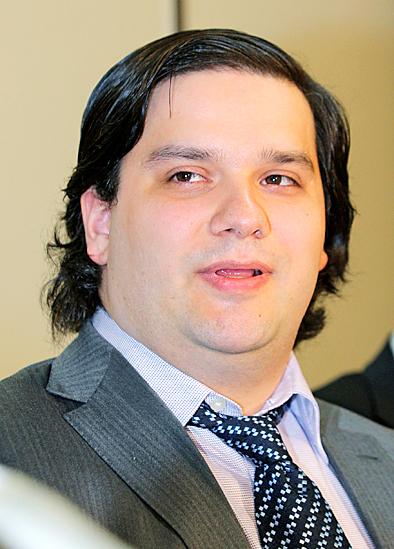The former CEO of collapsed bitcoin exchange Mt. Gox is to head to trial in Tokyo next week on charges stemming from the disappearance of hundreds of millions of US dollars worth of the virtual currency from its digital vaults.
Frenchman Mark Karpeles — once the high-flying head of the world’s busiest bitcoin trading platform, who reportedly lived in an US$11,000-a-month penthouse and spent money lavishly, including on prostitutes — is facing embezzlement and data manipulation charges.
“He is keeping calm as the trial gets underway,” his lawyer Kiichi Iino told reporters, adding that Karpeles plans to plead his innocence.

Photo: AFP
The 32-year-old was first arrested in August 2015 and released on bail nearly a year later over allegations he fraudulently manipulated data and pocketed millions worth of bitcoins.
Mt. Gox, which claimed it once hosted around 80 percent of global bitcoin trading, shuttered in 2014 after admitting that 850,000 coins — worth around US$480 million at the time — had disappeared from its vaults.
The Tokyo-based exchange filed for bankruptcy protection soon after the cyber-money went missing, leaving a trail of angry investors calling for answers and denting the virtual currency’s reputation.
Karpeles, who said he is working as an IT consultant, is active on social media and has commented on issues concerning bitcoin, but not on details of his criminal case.
“The charges [against Karpeles] only cover a subset of the issues which were happening at Mt. Gox, so I don’t expect that we will find out most of the information we want to know,” said Kolin Burges, a British investor who said he lost several hundred bitcoins in the Mt. Gox collapse.
“I’ve not had any back yet, but hopefully, eventually all the creditors will get a small percentage of their money back from the bankruptcy distribution,” he said.
Around the time of his 2015 arrest, Karpeles’ mother told the Yomiuri Shimbun that her son was a “genius” who learned computer languages at age three and started making simple programs by the time he was five.
In 2006, Karpeles wrote on his blog that computer crime was “totally contrary to my ethical principles.”
However, four years later, a Paris court sentenced him in absentia to a year in prison for hacking. He had come to Japan to work for a Web development company around 2009 and later got involved with the bitcoin exchange.
In the wake of the Mt. Gox scandal, Japan passed a bill stipulating that all virtual currency exchanges must be regulated by its Financial Services Agency.
Despite the demise of Mt. Gox and concerns about security, bitcoin and hundreds of rival digital currencies are becoming increasingly popular and accepted by merchants worldwide.
Bitcoin remains the most popular. Its market value has ballooned to more than US$42.9 billion, according to the coinmarketcap.com.
The unit has seen wild volatility during its short life, soaring from just a few US cents to around US$2,500 now, more than double its value just a few months ago.
Backers say virtual currencies offer an efficient and anonymous way to store and transfer funds online, but critics argue the lack of legal framework governing the currency, the opaque way it is traded and its volatility make it dangerous.

TECH TITAN: Pandemic-era demand for semiconductors turbocharged the nation’s GDP per capita to surpass South Korea’s, but it still remains half that of Singapore Taiwan is set to surpass South Korea this year in terms of wealth for the first time in more than two decades, marking a shift in Asia’s economic ranks made possible by the ascent of Taiwan Semiconductor Manufacturing Co (TSMC, 台積電). According to the latest forecasts released on Thursday by the central bank, Taiwan’s GDP is expected to expand 4.55 percent this year, a further upward revision from the 4.45 percent estimate made by the statistics bureau last month. The growth trajectory puts Taiwan on track to exceed South Korea’s GDP per capita — a key measure of living standards — a

Samsung Electronics Co shares jumped 4.47 percent yesterday after reports it has won approval from Nvidia Corp for the use of advanced high-bandwidth memory (HBM) chips, which marks a breakthrough for the South Korean technology leader. The stock closed at 83,500 won in Seoul, the highest since July 31 last year. Yesterday’s gain comes after local media, including the Korea Economic Daily, reported that Samsung’s 12-layer HBM3E product recently passed Nvidia’s qualification tests. That clears the components for use in the artificial intelligence (AI) accelerators essential to the training of AI models from ChatGPT to DeepSeek (深度求索), and finally allows Samsung

READY TO HELP: Should TSMC require assistance, the government would fully cooperate in helping to speed up the establishment of the Chiayi plant, an official said Taiwan Semiconductor Manufacturing Co (TSMC, 台積電) yesterday said its investment plans in Taiwan are “unchanged” amid speculation that the chipmaker might have suspended construction work on its second chip packaging plant in Chiayi County and plans to move equipment arranged for the plant to the US. The Chinese-language Economic Daily News reported earlier yesterday that TSMC had halted the construction of the chip packaging plant, which was scheduled to be completed next year and begin mass production in 2028. TSMC did not directly address whether construction of the plant had halted, but said its investment plans in Taiwan remain “unchanged.” The chipmaker started

LOOKING BRIGHT: Taiwanese tech stocks have been trading at 18 to 19 times earnings, beating the 15 percent long-term average amid AI-driven optimism, an analyst said Taiwan’s economy could expand by as much as 5 percent this year, fueled by its technology manufacturing edge amid a global artificial intelligence (AI) boom, while tariff exemptions on semiconductor products keep the country’s levy burden low despite a headline rate of 20 percent, UBS Investment Bank said yesterday. “Although Washington has imposed a 20 percent tariff on goods from Taiwan, exemptions for semiconductors keep the weighted average low,” UBS senior economist for Asia and China William Deng (鄧維慎) said. The growth momentum is expected to extend into next year, with technology companies’ revenue projected to rise 17 percent, UBS research head